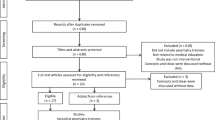Abstract
Explicit instructional objectives have become essential in medical education and have been developed nationally for students in surgery, gynecology, and pediatric clerkships. The authors describe the rationale for and process of developing psychiatry clerkship objectives, first at the Medical College of Pennsylvania (MCP) and then by the Association of Directors of Medical Student Education in Psychiatry. Faculty interviews about the development of psychiatry clerkship objectives at MCP illustrate the objectives’ positive educational impact.
Similar content being viewed by others
References
Liaison Committee on Medical Education: Guide to Institutional Self-Study. Washington, DC, Association of American Medical Colleges, 1990
Nielsen AC III, Eaton JS Jr. Medical students’ attitudes about psychiatry: implications for psychiatric recruitment. Arch Gen Psychiatry 1981; 38:1144–1154
Das MP, Chandrasena RD: Medical students’ attitude towards psychiatry. Can J Psychiatry 1988; 33:783–787
Hoeper EW, Nycz GR, Cleary PD, et al: Estimated prevalence of RDC mental disorder in primary medical care. International Journal of Mental Health 1979; 8:6–15
Jencks SF: Recognition of mental distress and diagnosis of mental disorder in primary care. JAMA 1985; 253:1903–1907
Bonis JF, Howes MJ, Devins NP, et al: Primary health care providers’ recognition and diagnosis of mental disorders in their patients. Gen Hosp Psychiatry 1988; 10:317–321
Ormel J, Koeter MWJ, van den Brink W, et al: Recognition, management, and course of anxiety and depression in general practice. Arch Gen Psychiatry 1991; 48:700–706
Murphy JM, Oliver DC, Sobol AM, et al: Diagnosis and outcome: depression and anxiety in a general population. Psychol Med 1986; 16:117–126
Goldberg D, Steele JJ, Johnson, A, et al: Ability of primary care physicians to make accurate ratings of psychiatric symptoms. Arch Gen Psychiatry 1982; 39:829–833
Eisenberg L: Treating depression and anxiety in the primary care setting. Health Aff (Millwood) 1992; Fall:149–156
Association of American Medical Colleges’ Policy on the Generalist Physician. Acad Med 1993; 68:1–6
Ende J, Pozen JT, Levinsky NG: Enhancing learning during a clinical clerkship. J Gen Intern Med 1986; 1:232–237
Bird J, Cohen-Cole SA, Boker J, et al: Teaching psychiatry to nonpsychiatrists: I. The application of educational methodology. Gen Hosp Psychiatry 1983; 5:247–253
Hiss RG, Pierce JC: A strategy for developing educational objectives in medicine: problem-solving skills. Journal of Medical Education 1974; 49:660–665
Johnson W, Snibbe J, Hoffman K, et al: Focused psychiatric curriculum selection: student, psychiatrist, and nonpsychiatrist physician expectations. Am J Psychiatry 1977; 134:1126–1130
Callen KE: Psychiatric education of nonpsychiatrists: is it relevant to medical practice? Psychosomatic 1980; 21:43–54
Holmes GR, Musher JS, Wright HH, et al: How recent medical school graduates evaluate the clinical relevancy of their behavioral science curriculum. Academic Psychiatry 1990; 14:17–20
Kosch SG, Dallman JJ: Essential areas for behavioral science training: a needs assessment approach. Journal of Medical Education 1983; 58:619–626
Melton RF: Resolution of conflicting claims concerning the effect of behavioral objectives on student learning. Review of Educational Research 1978; 48:291–302
Mast TA, Silber DL, Williams RG, et al: Medical student use of objectives in basic science and clinical instruction. Journal of Medical Education 1980; 55:765–772
Williams RG, Osborne CE. Medical teachers’ perspectives on development and use of objectives. Med Educ 1982; 16:68–71
Weissberg M: Less is more: the case for ”basic“ psychiatry and the Colorado medical student log. Psychiatr Q 1996; 67:139–151
Ping Kong HH, Robb K, Cleave-Hogg D, et al: Achievement of objectives: internal medicine fourth-year clinical clerkship. Medical Teacher 1991; 13:29–37
Swick HM: Educational objectives in medicine— some special problems. Programmed learning and Educational Technology 1979; 16:322–327
McAvoy BR: How to choose and use educational objectives. Medical Teacher 1985; 7:27–35
Gronlund NE: Stating Behavioral Objectives for Classroom Instruction. Toronto, Canada, Collier Macmillan, 1970
Chambers DW: The effects of faculty control of learning on student effort. Evaluation and the Health Professions 1991; 14:438–455
Williams RG: A behavioral typology of educational objectives for the cognitive domain. Educational Technology 1977; June:39–46
Author information
Authors and Affiliations
Rights and permissions
About this article
Cite this article
Brodkey, A.C., Van Zant, K. & Sierles, F.S. Educational Objectives for a Junior Psychiatry Clerkship. Acad Psychiatry 21, 179–204 (1997). https://doi.org/10.1007/BF03341432
Published:
Issue Date:
DOI: https://doi.org/10.1007/BF03341432




